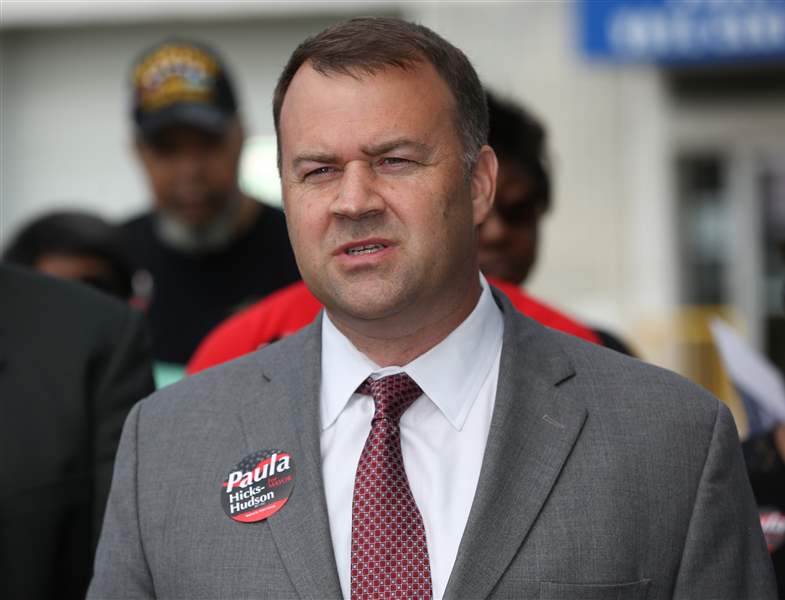
Ohio Democratic Party in labor dispute with campaign workers
9/7/2018
Ohio Democratic Party Chairman David Pepper speaks in Toledo in 2017. The state's Democratic Party is in a labor dispute with campaign workers.
The Blade
Buy This Image
OBJECTCOLUMBUS — The party of organized labor in this state has run into a little labor friction of its own as the Ohio Democratic Party negotiates its first contract with a fledgling union representing about 80 on-the-ground campaign workers.
The Washington-based Campaign Workers Guild sent a letter to county party chairmen to express frustration that state party Chairman David Pepper and Executive Director Greg Beswick haven’t been personally at the table in negotiations and, the party has hired a law firm that tends to financially support Republicans.
The dispute has put the party that usually has the backing of organized labor into the position of management during contract negotiations.
“These are hardworking workers, and it has been easy in the past for this type of worker to get taken advantage of,” Mr. Pepper said. “We’re proud to be the first state party in the nation to recognize the union, and we’re now working through the details.”
The party hired the law firm of Taft, Stettinius & Hollister, a firm that typically represents management in labor negotiations.
The union describes it as “the union-busting Taft firm, which brags about its role in the notoriously anti-union Taft-Hartley Act.”
But the party is quick to point out that the lead attorney on the case, Mike Mentel, is a Democrat and former president of Columbus City Council. The union’s president, Laura Reimers, however, said the lead attorney in negotiations has been Taft attorney Conor Meeks, who the letter described as “a registered Republican who lives in Kentucky and specializes in union avoidance — a polite term for union busting.”
Negotiations affect field workers hired for Democratic campaigns and not permanent staffing for the state party.
In its letter to county chairs from a dozen regional union leaders, the union wrote that it was initially excited by the state party’s decision in July to become the first to recognize the relatively new union. The move represented a major step for the union.
“Unfortunately, this excitement has not held at the bargaining table, where we’ve been continually disappointed and angered as the ODP has refused to present proposals that ensure us the union protections and provide us the working conditions we need and deserve,” the letter reads.
“After several day-long bargaining sessions, the ODP has made it clear to us that they are not serious about negotiating a fair contract that lives up to our Democratic values.”
But the party insists talks have made significant progress and that Mr. Beswick was at the table for the first of several negotiations sessions..
“Because this is the first contract of its type in the nation, there are many details to work through,” party spokesman David DeWitt said. “But in only four weeks, negotiations over the contract itself have led to agreement on half the points of negotiation, and we’ve made progress on many others.”
The dispute occurs as campaign workers are on the ground in the home-stretch of races for governor, a U.S. Senate seat, and other statewide campaigns. With the exception of U.S. Sen. Sherrod Brown, Ohio Democrats are locked out of every statewide office and are greatly outnumbered in both the state House and Senate.
“The good news is that while [the dispute] takes place among our representatives, we and our growing team of organizers are out knocking on the doors and making the phone calls that will elect our strong ticket of candidates up and down the ballot,” Mr. DeWitt said.
The union says that the party has proposed an hourly wage, depending on the number of hours, of $12.25 per hour that would decline to $10.50 as Election Day approaches. It claims the party has offered a mileage or car allowance proposal that wouldn’t cover the cost of gas for workers required to use their own vehicles.
Mark Caleb Smith, director of the Center for Political Studies at Cedarville University, said he isn’t surprised that labor disputes have come to roost at the political party level.
“Campaigns are expensive,” he said. “Historically, campaign ads have driven the cost of campaigns, but that has shifted recently. Human resources have become more important with get-out-the-vote efforts, so it doesn’t surprise me that we may see more resistance because that can drive wages up.”
Contact Jim Provance at jprovance@theblade.com or 614-221-0496.